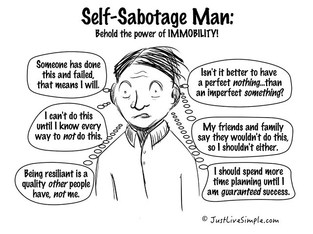|
Sabotaging is to deliberately destroy, damage, or obstruct something. Now, imagine doing this yourself that to your self, diligently, day in and day out year after year. That's some serious self-sabotaging. It is not that we are consciously choosing to sabotage ourselves. It happens as if it is an automatic program, a program that got embedded in childhood, a non-stop tape inside our heads that constantly speaks to us in a voice that tells us what's 'wrong' with us, why we cannot succeed despite working hard and how things will never be any different. It is a program that tells us we are not OK, and it keeps getting reinforced till it becomes so scary for us to come close to actually tasting real success, or find our true potential, that we scuttle our chances, we sabotage ourselves so that the 'I knew I couldn't get it' program can win, yet again  What constitutes self-sabotaging behaviour ? The self-sabotaging stems from a firm belief that we are undeserving of love, unworthy of victory, incapable of achieving goals and with every successive 'I told you so' the belief hardens and this in turn reduces our ability to achieve what we want. With every failed attempt, we are proving ourselves that we are incapable of being good at anything. Seeking success of any kind makes our this program kick in, and we start anticipating failure, pain and emotional hurt. To try and protect ourselves from this anticipated pain, we do something or get into behaviours that make it impossible to even attempt and certainly difficult to succeed. That's self-sabotaging behaviour. Self-sabotaging in that sense comes from a need of self-preservation. We create something that can take the blame for the failure. We now have a reason for why something didn’t work out. Our failures therefore are not a result of incompetence but an outcome of choosing some other thing, or an act of nature or just plain bad luck. Sometimes, self-sabotaging behaviour comes across as simple forgetfulness ('Oh, dang! I forgot my cell phone. Now, I just cannot call her to ask for a date.') or procrastination. At other times, it can even seem altruistic and magnanimous - like giving to a competitor your key insights and work products. It can get really dangerous as well - like the dancer who literally breaks a leg for fear of getting on that stage, or the lover who deliberately cheats because this relationship is getting serious. Over the long term, such instances of self-sabotage can become patterns of really harmful behaviour: self-medicating, substance abuse and other ways of self-harm, and that can really be a challenge How do you tell if you are self-sabotaging ? Ask yourself:
What can help you stop self-sabotaging?
Stopping self-sabotage is a matter of getting more aware, challenging your beliefs and making new, conscious choices that allow for learning.
|
InnerSight BloggersAjanta, Mahesh and other InnerSight counsellors and guest contributors are happy to share their thoughts here. Categories
All
Archives
September 2020
|

 RSS Feed
RSS Feed